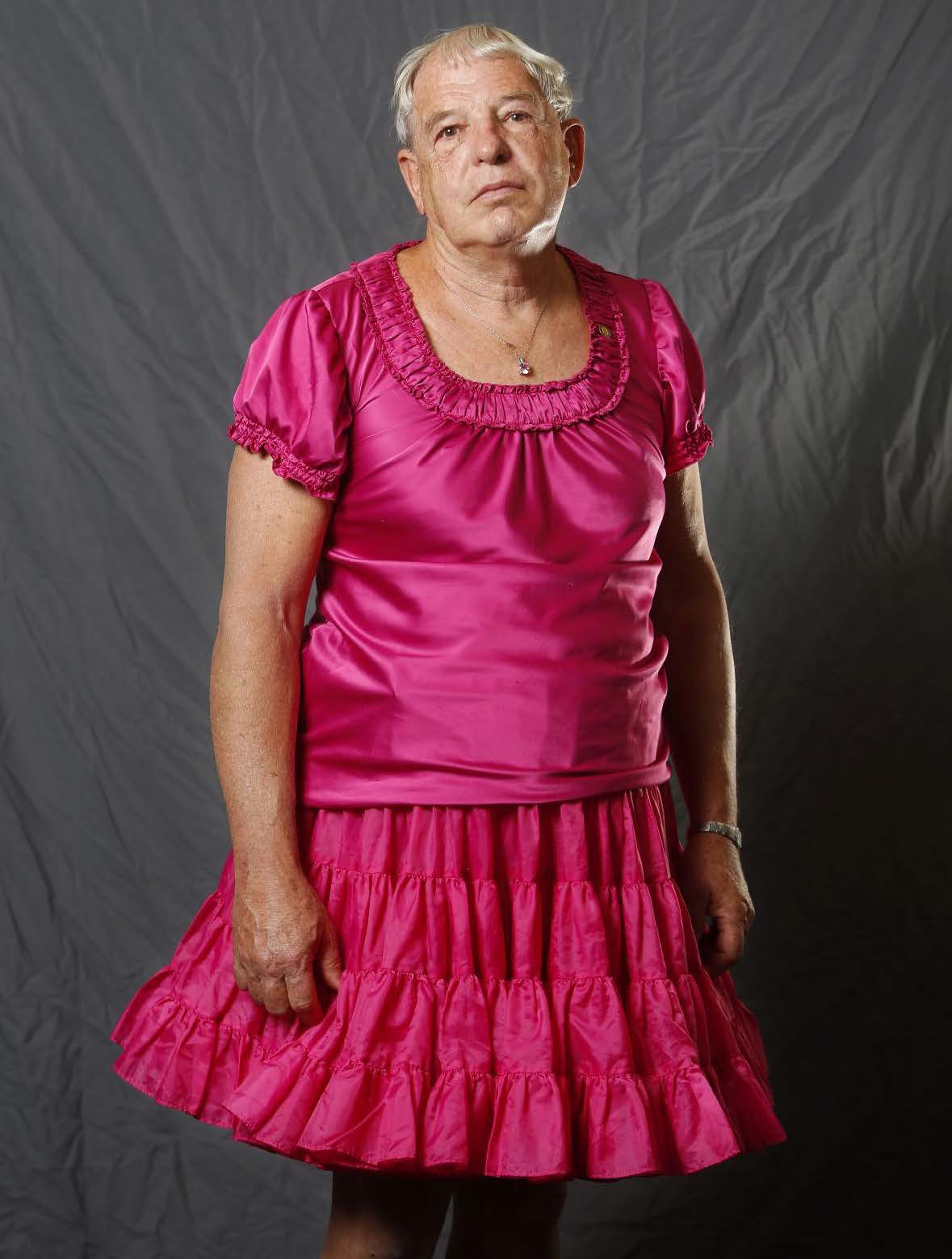
SISSY GOODWIN, 1946-2020: To the end, Sissy was a force for compassion, for benevolence, for warmth, for respect, for affection, and for love (in its highest)
The Toughest Boss I'll Ever Have
BY MICHAEL JOHN CARLEY
During my years with Veterans for Peace Inc. (VFP, 1991-2001), I reported to a noteworthy Board of Directors of former service men and women. I've written about them before on several occasions.1 I'll probably never stop. But out of all the toughfolk they were and are, one stood out as the toughest – a rodeo cowboy, bull rider and Vietnam-era veteran from the conservative state of Wyoming named Sissy Goodwin. Sissy wore women's clothing.
Sissy had been raised by a horror-movie mother and stepfather, the latter of whom went from oil rig job to oil rig job and town to town, often being fired for beating up his ever-changing bosses. One year, Sissy went to eight different schools. At home, he was physically abused, and constantly called a "dumbshit" despite his having later recorded a 145 on an IQ test. Having succumbed to their assessment as a means to get by, Sissy chose the Air Force because he didn't deem himself smart enough for college. Secretly wearing women's clothing was the only thing that made him feel good inside.
But then he met his future wife, Vickie. To her, he was simply the embodiment of the kind of guy who, while tough, really just wanted to pull over to help someone whose car had broken down. Shortly after their engagement, he shared his truth—that even when performing in rodeos, he was wearing women's panties underneath. In a 2015 NPR StoryCorp episode2, she recalled herself thinking, "'Well, that's not a big deal.' But one of the hardest things was that people made fun of this person that I loved." Probably strengthened by that love, he stopped hiding, and the "better or worse" aspect of their lives really kicked into high gear. In "A Boy Named 'Sue'"–fashion, he changed his name to "Sissy," figuring that if he was going to be called that name constantly, that he might as well own it. Vickie often made him stand in front of a mirror and say, "I am a good person."
Due to his intelligence, the dress-wearing employee offset how uncomfortable he made his colleagues, and rose through the ranks at the power plant where he worked. He eventually went to college for math and science. They had two children, and, at the end of his career, he taught power plant technology at Caspar (WY) College, and on the side served for ten years on the board of the ACLU's state chapter.
But he was stopped frequently by police, who separated and quizzed his family as to whether he abused them. He was arrested a few times – "public indecency" or whatever, though charges never resulted. At a work trip to Utah, he was asked to leave a store by a hotel manager, and when Sissy refused, the hotel manager ordered his security forces to throw Sissy to the ground, cuff him, arrest him, and bring him to jail. Another time his ear was split open from an assault in the Kansas City airport. And once, in front of his family on his own front lawn, a stranger beat him up so badly that his teeth were pushed in. He was assaulted frequently but rarely called the police. In a state like Wyoming, the chances were simply better that he, and not the assailant, would be the one arrested.
His children went through periods of vocal and painful resentment. He and Vickie had rough patches—she constantly feared for him, and for their children. "I questioned my belief systems. He questioned my belief systems," she later wrote. The comments from strangers seemed daily. Sissy struggled with intense depression from the guilt he felt for what his family was going through.

POWER MOVES: (Above) Sissy rose through the ranks at the power plant where he worked, went to college for math and science, and eventually taught power plant technology at Caspar College; (Right) Vickie Goodwin with Iraqi teachers in the Basra area in March 2001. Seeing her handle the drama of that trip, much of Sissy's strength was explained — for how could lesser partners stick with someone who elicited in their surroundings so much fear, unless that partner was of at least equal strength?
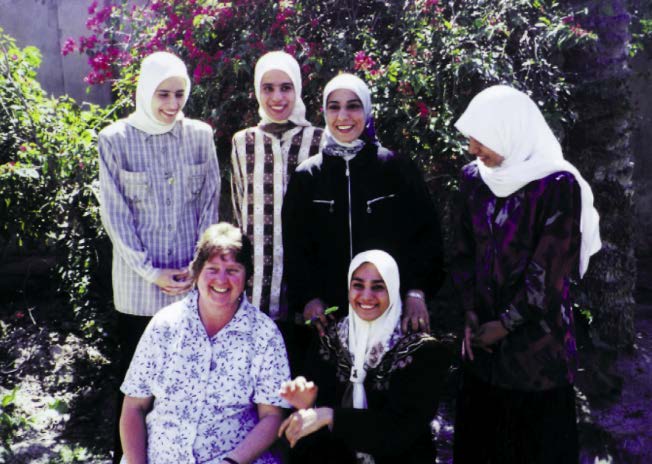
He was voted to the Board of VFP by membership in the late1990s. This came after starting the state's only VFP chapter in his hometown of Douglas, and after having appeared as a VFP representative on "Pastors for Peace" delegations to Nicaragua, Chiapas Mexico, and El Salvador, where he served as an election monitor. I worked for VFP from 1991-2001. My post as UN Representative with VFP starting in 1997 was my (cooler than usual) "stupid day job" that supported a NYC playwriting career. And being the brash young man that I was, one surrounded by far healthier LGBTQ culture than anything Sissy had seen, I immediately felt a dual promise to myself to both protect him, and change his wardrobe (to infinitely more stylish women's clothing). I did not succeed in the latter. But our commitment to one another was instantly solidified. Three years away from my spectrum diagnosis, my superiors always credited me with brains and guts, but they also had to add disclaimers about how weird I could be. Sissy never made me feel weird.
In our email conversations, before getting to the raison d'etre of the communication we small talk-jabbed at one another based on big city vs. country boy iconography, rather than any discrepancy of orientation. I was "Slick" to his "Hickster."
"P. S. I am tired, you know how strenuous tipping cows can be?" "P.S. Lay off the corn liquor and eat a crepe for God's sake." "Crepe? What in the hell is a crepe? Never drank one of them things!" "Nicely done at the meeting today, hickster." "It's easy being your friend. Just do not tell anyone. I have a reputation to protect. Love ya, Sissy."
As my Iraq Water Project (IWP), was threatened by Board members who felt they weren't getting enough credit, Sissy kept them at bay for me. And I only somewhat was able to return the favor. For even in a progressive organization like VFP, Sissy's cross-dressing often ran afoul. I got into more than one argument with Board members who complained that Sissy's attire was "misrepresenting" the organization, or "confusing our message." To my, but not Sissy's astonishment, even a gay veterans organization didn't want his involvement.
And when he and I were being serious, I begged him to leave Wyoming. I asked him to choose life instead of death. I promised him that he couldn't even conceive of what true self-love, or true community could feel like. I wanted him and his family to feel welcomed. But Sissy, being older and wiser, knew that his life couldn't be addressed on my terms.
Lucky enough to have someone like Sissy in my life, I was one of the few who also got to know Vickie. A very active participant in Wyoming's democratic party, she'd been sharing her grant writing skills for VFP when she asked to take part in a 2001 delegation I was bringing to Iraq as part of the IWP. And seeing her handle the unexpected drama of that trip, much of Sissy's strength was explained – for how could lesser partners stick with someone who elicited in their surroundings so much fear, or so many insecure external questions about pride, community, bedroom activity… unless that partner was of at least equal strength?
She once wrote of how she long ago stopped lamenting, and instead was so glad that she had not married the man she had originally wanted to marry.
After Sissy and I both left VFP, the world woke up, took notice, and Sissy was suddenly a media darling. In addition to the aforementioned StoryCorp episode (bring Kleenex), there was a 2004 Dateline NBC story on him (which I couldn't find on the internet), and a lovely video made by the LA Times in 2015.3 Even Wyoming was starting to change. In 2017, a Wyoming Republican senator named Mike Enzi, in speaking to high-school students, referred to Sissy by saying "I know a guy that wears a tutu and goes to the bars on Friday night and is always surprised that he gets in fights. Well, he kind of asks for it a little bit."4 Well, Enzi's remarks sparked the hashtag #liveandlettutu. All throughout the state, residents posed in tutus on twitter to show their support for Sissy. Even Sissy's entire class of students at Casper College showed up one day wearing tutus, and pink hair ribbons similar to the ones Sissy loved to wear.
Try to remember, as you read all this, that Wyoming is the state where in 1998, college student Mathew Shepard was tortured and killed for simply being an out gay man,5 an event that occurred during Sissy's and my period of working together. Herein especially, I pushed Sissy to get out of Wyoming. But despite his agony over the event and all that it illuminated, Sissy wouldn't leave. Maybe he saw what others couldn't – that he would eventually change people in his state, and that the beatings and dehumanizing would somehow have meant something.
What I have to reluctantly admit is this: that Wyoming is also one of the most beautiful states in this country. It really is an honor to look at, even if it renders the actions of its bigoted inhabitants even more inexplicable. I've had four speeding tickets in my life; and despite a speed limit of 80 or 85 on those empty highways, two of them were in Wyoming. I simply couldn't take my eyes off the scenery. Maybe that was part of it too (I know it was for Vickie). A final factor to consider was that Sissy's formative years occurred without a true trans community. He felt he was going it alone, and maybe was. Many readers may have wondered why I used masculine pronouns in this writing, and didn't refer to him as "trans," "drag queen," or even a "cross-dresser." I used the terms that Sissy chose, as do we all when referring respectfully to anyone. Maybe in another era Sissy would have joined the parade. But where he was at, he wanted to be known as "a guy who liked to wear women's clothes."
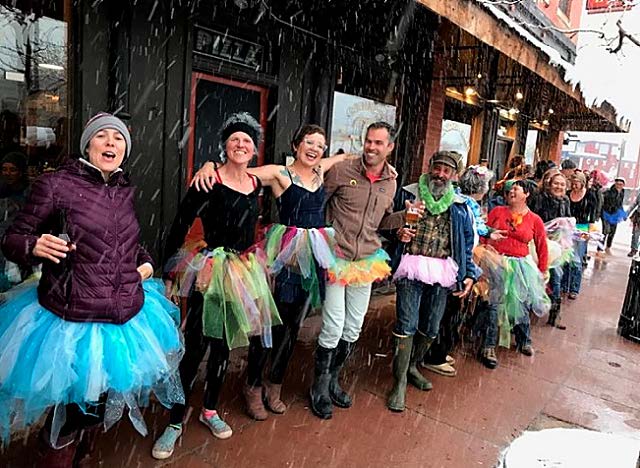
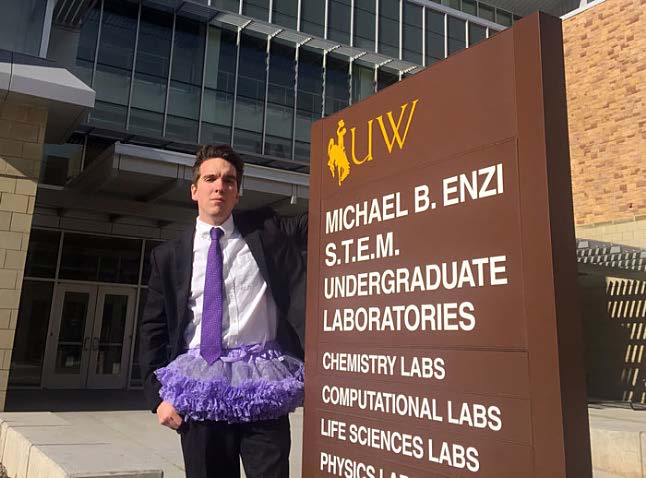
TUTU FOR THE SHOW: (Left) After Senator Mike Enzi's remarks sparked the hashtag #liveandlettutu, residents gathered for special events and posed in tutus on twitter to show their support for Sissy. Even Sissy's entire class of students at Casper College showed up one day wearing tutus, and pink hair ribbons similar to the ones Sissy loved to wear; (Above) A University of Wyoming student poses in front of the university building that bears Sen. Mike Enzi's name.
Recently though, he gave in a little to the young people, and ry to remember, as you read all this, that Wyoming is the state where in 1998, college student Mathew Shepard was tortured and killed for simply being an out gay man,5 an event that occurred during Sissy's and my period of working together. Herein especially, I pushed Sissy to get out of Wyoming. But despite his agony over the event and all that it illuminated, Sissy wouldn't leave. Maybe he started referring to himself as a "gender-enhanced man." "Slick," he wrote me after I resigned from VFP, "here is wishing you that the muggers treat you well and the drive by shooters have bad aim. Be at peace and know you are loved." His toughness got him in the end. By the time he either felt, or admitted to the fact that there was something wrong, it was too late. The brain cancer had advanced too far. He had five, well-spent weeks before he passed.
By that time, he had two children that were proud of him. He had grand, and even great grandchildren. One of his children even changed her pronouns. Vickie, a writer herself, once clarified in an article; "To be clear – (Sissy) doesn't wear women's clothing – everything he puts on belongs to him." And his beloved state? His body was interred with military honors at Wyoming's Oregon Trail State Veterans Cemetery. And the Wyoming Legislature recognized Sissy with a bipartisan resolution that listed his service during Vietnam, plus his experience as a rodeo cowboy, and bareback bull rider. Enzi apologized to him away from the cameras, and Sissy reported that the apology was sincere.
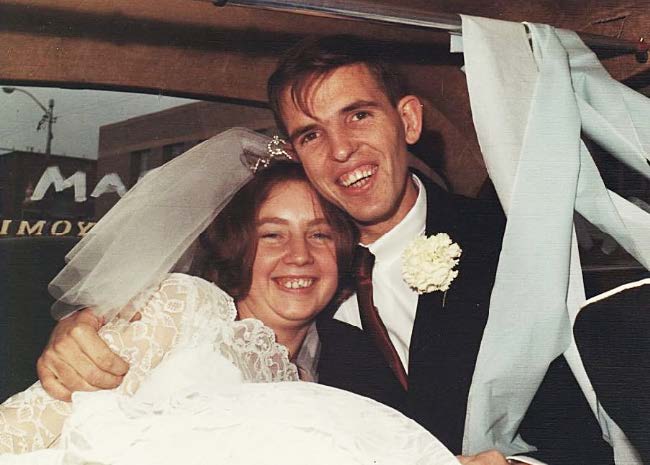
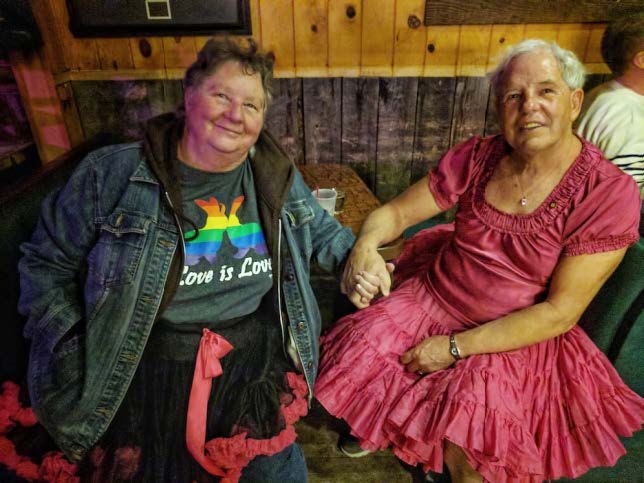
BEYOND GOLDEN: (Above) Vickie and Sissy were married for 51 years. To her, he was simply the embodiment of the kind of guy who, while tough, really just wanted to pull over to help someone whose car had broken down; (Right) At Laramie, WY's Buckhorn Bar during a "Live and Let Tutu" event in 2017. Vickie once wrote of how she long ago stopped lamenting, and instead was so glad that she had not married the man she had originally wanted to marry.
Sissy always protested, and he always flew the flag from his house. Of his military time he once said: "I served to protect your right to say, or dress, or look, or act or have the religion you want to."
His first name was a doozy. But his family name had value too.
Sissy was the stubbornest cowboy, and the toughest boss I ever had not because of his ability to replicate the staples of macho iconography. Any moron can do that so long as they're confident and willing. Sissy was the toughest because amidst all the cowardice around him—that was so determined to punish the very concept of the unknown—that to the very end Sissy Goodwin mowed elderly neighbors' lawns, and stopped for strangers stranded on the side of the road. To the end he was a force for compassion, for benevolence, for warmth, for respect, for affection, and for love (in its highest). His bride of 51 years said it best (to his face) in that magnificent StoryCorps piece. "I love the person I have become because of you."•
ABOUT THE AUTHOR:
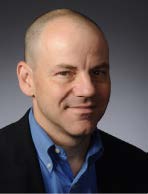
Michael John Carley is the Founder of GRASP, a school consultant, and the author of Asperger's From the Inside-Out (Penguin/Perigee 2008), Unemployed on the Autism Spectrum (Jessica Kingsley Publishers 2016), the upcoming Book of Happy, Positive, and Confident Sex for Adults on the Autism Spectrum… and Beyond!, and the column, "Autism Without Fear," which for four years ran with the Huffington Post. Currently he is the Consultant for Disability Inclusive Culture at New York University, a writer for many, and on Mondays he sees individual clients. For more information on Michael John, or to subscribe to his free newsletter, visit michaeljohncarley.com
References
1. huffpost.com/entry/autism-without-fear-advice-for-young-autistic-authors_b_9672754
2. storycorps.org/stories/sissy-and-vickie-goodwin-150403
3. youtube.com/watch?time_continue=14&v=qtdPybPBXcY&feature=emb_logo